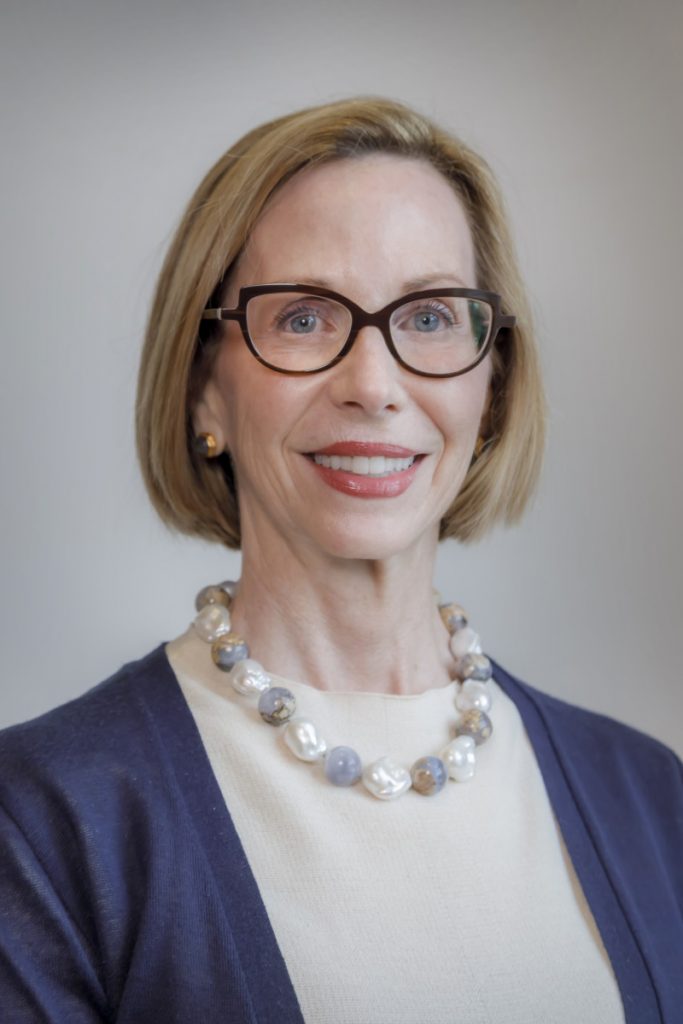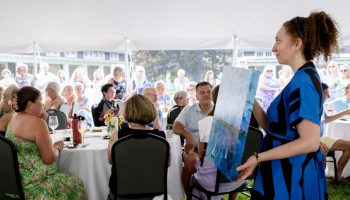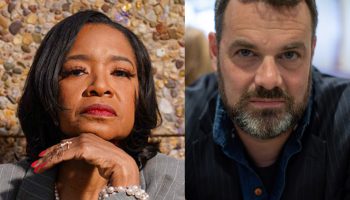Since its inception in 1889, presidents and members of the Chautauqua Women’s Club have been influential in state, regional, national and even global policymaking — not only as leaders in the growth of the Chautauqua and temperance movements, but also as proponents of the women’s suffrage and the 19th Amendment, the League of Nations, the United Nations Universal Declaration of Human Rights, and state ratification of the — as yet still proposed — Equal Rights Amendment.
In 2020, during the precarious early months of the COVID-19 pandemic, Kelly Boyce Himebaugh began serving as the CWC’s 25th president.
Throughout that season, the CWC House at 30 South Lake Drive lay dormant. Rather than introducing CWC speakers from the podium in the Hall of Philosophy and the lectern at the house, as had been customary, during the first season of her presidency, Himebaugh welcomed them from studio spaces in the Amphitheater, where audiovisual recordings were filmed for the CHQ Assembly.
New York State Governor Kathy Hochul, who in 2020 served as New York’s Lieutenant Governor and chair of the state’s Women’s Suffrage 100th Anniversary Commemoration Commission, was one such speaker. Although she joined Himebaugh in the Amp, Chautauquans had to watch her Contemporary Issues Forum address online, as Hochul likened the early women’s suffrage movement to “unfinished business” and connected it to challenges faced by modern social movements.
“I feel the presence, the inspiration of Eleanor Roosevelt and Anna Pennybacker (CWC president from 1917 to 1938),” Himebaugh said. “We have to honor the women who came before us: the Greats. It’s in our DNA to always remember them.”
So much so, that a large black and white photograph of Pennybacker and Roosevelt, who visited both Chautauqua Institution and the CWC several times as the first lady of the State of New York and later of the United States, has been prominently displayed in the CWC’s living room for several years.
The Contemporary Issues Forum is the CWC’s most prestigious weekly programming event and in normal seasons occurs on Saturday afternoons in the Hall of Philosophy. Himebaugh described it as “a great way to showcase a diversity of thought and interests.”
The CWC also welcomes an Amp lecturer to its weekly afternoon Contemporary Issues Dialogues program, affording Chautauquans another opportunity to ask questions relevant to the weekly theme, and even to diverge from it.

Himebaugh said that she has been coming to Chautauqua since she began dating her husband, Lyle — a Chautauquan whose family lived in nearby Jamestown during the off-season — 32 years ago. For years she said she was, “off and on,” an annual CWC member.
“I was playing softball here and Mary Pat McFarland (CWC’s longtime program chair) asked me if I’d want to get more involved in the CWC,” she said. “This was the Barbara Vackar and Paula Mason era. They were mentors. I really looked up to them. I gave up my summers, but I have built lifelong friendships.”
Circa 2012 or 2013, Himebaugh became a life member and joined CWC’s board of directors.
“I found my purpose here, and such joy,” she said. “I love intergenerational relationships, and meeting such interesting women who were so smart and came from all walks of life. I fell in love with the women and CWC’s purpose and mission.”
Having attained the position of president in part by serving on its membership committee, and by chairing its program, development and nominating committees, she gained a broad and deep understanding of the evolution of the inner workings of the CWC as a standalone 501(c)(3) organization which is legally separate from Chautauqua Institution.
She also went above and beyond by seeking professional advice from nonprofit leadership expert, executive coach and strategic adviser Joan Garry, whom Himebaugh then invited to Chautauqua to open this season’s Contemporary Issues Forum series.
Garry’s talk, which, for those who missed it, will be available on the CHQ Assembly after the season ends, was titled, “ADVOCATE: Noun, Verb, You!”
“I think the Club has become more and more organized over the years,” Himebaugh said. “As with any organization, it’s grown (and) become a flourishing organization (for which) you need specific skill sets.”
Knowledge of securities, employee benefits and insurance, and small business management, are among the strengths and skills that Himebaugh has brought to the CWC.
She grew up in Carmel in New York’s Hudson Valley. After majoring in business economics in college, she worked as an assistant to a top bond salesman. She passed the exam for a Series 7 license that enabled her to sell most types of securities. She left Wall Street to begin her first insurance job at Equitable.
“I worked with business owners and corporations on life, disability, medical, dental and all those benefits,” Himebaugh said. “I loved it.”
Eventually she started her own insurance agency — KBH Group, LLC — which specialized in insurance and employee benefits consulting. Over 27 years, she moved it from New York City to Westchester County, New York, and then to southwestern Connecticut.
Although she sold the group in 2010, Himebaugh said that she has continued consulting for The Starr Foundation, which is one of the largest U.S. foundations.
Reflecting on her evolving role as CWC president, Himebaugh feels that the people who visit the CWC are constantly evolving.
“The demographics have changed. Meeting the needs of the members and the Chautauqua community has become more challenging because it’s no longer people coming in for the season. You have to recognize (that there are more) weekly guests and (vary) your offerings … and opportunities so people can meet new friends.”
She said there is a wide variety of people who may visit the CWC and its programs.
“A person who might come to … a chocolate tasting is different from a person who comes to (a presentation on) drones or exoplanets.”
The latter two talks were part of this season’s Chautauqua Speaks series, overseen by McFarland, which showcases people in the greater Chautauqua community who are engaged in activities or professions of general interest.
During the 2021 season, the Chautauqua Speaks series was conducted on both the porch of the CWC House and under a tent set up on its front lawn in order to limit indoor exposure to COVID-19 and its variants. This season, the CWC House was opened up to the public and presentations were mainly given in its spacious living room.
In addition to sponsoring two weekly lecture series, the CWC hosts special events and recreational activities. This season there were wine tastings in addition to a chocolate tasting, receptions, dinners, concerts and Orvis fly fishing 101 classes.
Mah Jongg is Mondays and Fridays, and Duplicate Bridge on Tuesdays. Language Hour is on Wednesdays.
“We try to have a wide breadth of programming that appeals to all,” Himebaugh said. “Our recreational activities are so popular that we’re thinking of expanding.”
Because the CWC is also committed to providing life-changing scholarships to performing and visual arts students who would otherwise not be able to afford to study and hone their skills at Chautauqua, fundraising is essential.
Over the years, the CWC has raised nearly $1.8 million for its scholarship fund.
“The Flea Boutique has taken off and continues to be a community gem,” Himebaugh said.
The Farmer’s Market has continued donating 25% of their proceeds from their Sunday, Wednesday and Thursday afternoon sales to the CWC scholarship fund.
Other fundraising initiatives this season were the pop-up tent sale during the last weekend of July, collection baskets at student concerts, orders for Friday night dinner take-out, homemade boxed lunches for the Bird, Tree & Garden Club House and Garden Tour, and orders for cans and cases of Chautauqua Farms peanuts.
“We’re reaching out to all of the different community groups,” Himebaugh said. “… The goal is to connect with other organizations on the grounds. We’ve done a really good job this year on that.”
She is grateful for the support of the CWC’s members and the greater community.
“Life is changing, the world is changing, technology is changing,” Himebaugh said. “Like all organizations, we want to stay relevant, and we are looking beyond the gates. … We are (engaged) year-round. The (volunteer) board meets every month, (as do) the executive committee and other committees. … Development, programming, scholarship — those are key. They require a lot of work from a core group.”
For marketing and communication purposes, 99% of the planning must be completed before May.
“We hit the ground running in June,” she said, “and don’t stop until the end (of the season).”
Despite all the work that such planning entails, Himebaugh said that the CWC is exploring expanding its year-round programming.
“One of the most popular … events was during COVID … as a way to touch members. We started a virtual wine tasting event with an expert. We have met 27 times, and connect almost once a month at 5 p.m. on Sundays. … Now we’re planning a trip to Tuscany in April 2023. So we’re building community, inside community.”
Enriching the Chautauqua experience by welcoming and building community, and by serving as “the heartbeat of Chautauqua” is for Himebaugh one of the most satisfying aspects of her involvement with the CWC.
“It’s an exciting time for the Women’s Club,” she said. “We’re looking towards the future and the opportunity to expand our presence and our legacy. … It’s all about lifelong learning, even down to our wine tasting.”




